How To Use Almond Oil To Help Control Hair Loss
Home remedies to help you reap the maximum hair care benefits of this wonder oil.
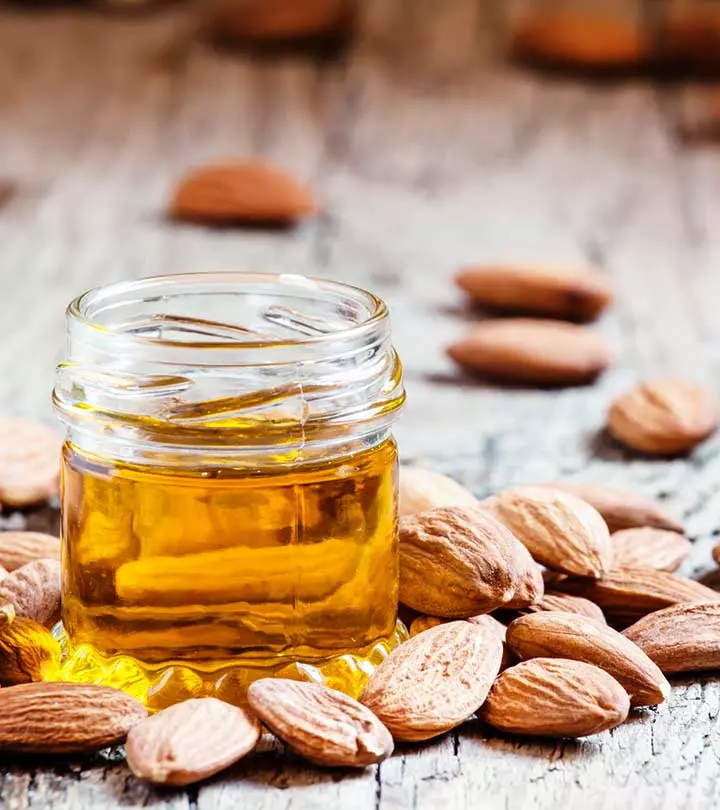
Image: Istock
Let’s talk about almond oil to control hair loss. If your hair is becoming thinner, you can improve it by following a proper hair treatment that includes the right elements. Almond oil is one such ingredient that can curb hair loss (1).
Almond oil softens, nourishes, and strengthens your hair. It also works as a very good cleansing agent (2). What role does almond oil have in hair growth? Continue reading to learn more.
In This Article
Nutritional Composition Of Almond Oil
Almond oil is packed with healthy nutrients, making it a valuable addition to your diet. It’s rich in unsaturated fats, with oleic acid ( approx 56.64–64.03%) and linoleic acid (approx 24.57–29.80%) known for their heart health benefits. This oil is abundant in tocopherols (408.99–491.77 mg/kg), predominantly α-tocopherol, a potent form of vitamin E that supports skin health and reduces oxidative stress. Additionally, almond oil contains natural antioxidants like phenols (85.33 to 141.66 mg/kg) and energy-rich compounds like trioleylglycerol (30%) and dioleyllinoleoylglycerol (27.25%) (3).
Now, scroll down to learn how these components benefit your hair.
Key Takeaways
- Using almond oil for hair may give you thick, heavy, and strong tresses.
- Almond oil massage may prevent hair breakage as it has anti-inflammatory properties.
- This oil may encourage hair growth as it contains antioxidant properties.
- Almond oil massage may increase blood flow to the scalp, which can boost nutrient delivery to the hair follicles.
Benefits Of Using Almond Oil For Hair Fall Control
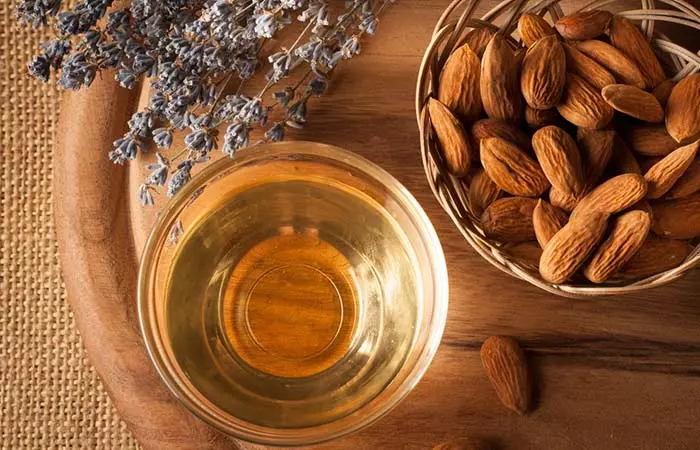
Almond oil offers a multitude of benefits for hair health. This is because it has anti-inflammatory properties and is rich in fatty acids, such as omega-6, omega-3, and omega-9 fatty acids (4). It also contains vitamin E, which is known for its high antioxidant activity, and magnesium. Here’s how these properties boost hair health and treat hair fall:
1. Nourishes Hair And Promotes Hair Growth
Almond extracts were shown to promote hair growth in rat studies (5). It contains minerals and proteins that stimulate hair growth while strengthening hair. Anecdotal evidence also shows that it makes hair soft while adding hair shine. Hair massage with almond oil works towards hair nourishment, increases hair thickness, and hair volume.
2. Repairs Damage

Almond oil manages damage caused by heat styling tools, such as blow dryers, straightening irons, and curling rods (6). It smoothes, hydrates, and strengthens the internal hair shaft to prevent further heat damage. It also helps heal chemically treated hair. This helps minimize hair breakage and increases hair strength.
3. Rich Content Of Antioxidants
The vitamin E present in almond oil is an antioxidant (7). It helps fight oxidative damage and may help boost hair growth (8).
4. Anti-Inflammatory
Almond oil has anti-inflammatory properties (9). These properties can help soothe an aggravated and irritated scalp. The abundance of pollution in our environment can lead to issues, such as itching, dandruff, and, in extreme cases, hair fall. The oil’s anti-inflammatory properties help soothe these symptoms.
5. Improves Blood Circulation

Massaging almond oil into your scalp helps improve blood circulation. This ensures that your follicles are better nourished, so they can produce healthy hair.
6. Controls Oil Production
Hair fall is a common problem among people with oily hair. Anecdotal evidence suggests that almond oil helps calm the overzealous sebaceous glandsi Small glands present in the hair follicles produce an oily substance called sebum that keeps the hair moist and prevents dryness. and controls oil production. It is also one of the lightest hair oils that successfully keep your hair conditioned without weighing it down, making it ideal for both oily and dry hair types.
One of the biggest reasons for hair fall is bad scalp health. A healthy scalp is the foundation for healthy hair. Using almond oil can restore scalp health and ensure healthy hair growth. It can also stimulate hair regrowth from dormant hair follicles.
Amy, a YouTuber, shared her positive experience with the transformative effects of almond oil on her hair. According to her, almond oil is her go-to solution for combating dryness, whether it’s on the ends of her hair or her scalp. Showing visibly positive results on her own hair, which appears healthier, shinier, and more vibrant after incorporating almond oil into her routine, she said, “I really love doing this mask at least once a week; I highly recommend you guys giving it a try (i).”
 Did You Know?
Did You Know?Using almond oil benefits hair in a variety of ways. They help support hair growth and reduce breakage. Here are five ways to use almond oil for hair loss:
How To Use Almond Oil To Help Control Hair Loss
1. Almond Oil And Lemon Juice

The vitamin C in lemon juice helps boost collageni A protein present in the cartilage, bone, tendon, and hair follicles that provides the building blocks for creating new hair. production, which directly influences hair growth (10).
You Will Need
- 2 tablespoons almond oil
- 2 teaspoons lemon juice
Processing Time
35 minutes
Method
- Mix the almond oil and lemon juice in a bowl.
- Section your hair and apply the mixture to your hair and scalp.
- Massage the oil into your scalp for at least 5 minutes and then wait for half an hour.
- Rinse the oil off with a mild shampoo.
How Often?
You can repeat this up to 3 times a week.
Note: Lemon juice is acidic. Therefore, using it excessively or without diluting it can irritate the scalp.
2. Almond Oil And Egg
Eggs are packed with proteins that help nourish your hair follicles and aid hair growth (11). This pack also helps in hair frizz control for people who have dry, untameable hair.
You Will Need
- 4 tablespoons almond oil
- 1 raw egg
Processing Time
40 minutes
Method
- Whisk the egg and almond oil until you get a smooth mixture.
- Wash and dry your hair.
- Apply the mixture to your freshly washed hair in sections.
- Let it sit for 40 minutes and then rinse it out with shampoo.
How Often?
Use this hair mask once a week.
Note: Avoid using hot water while washing the mask out of your hair since it can cook the egg and make it nearly impossible to get the egg smell out of it.
3. Almond Oil And Yogurt
Yogurt helps keep your hair clean, conditioned, and damage-free (6). When combined with almond oil, it may help boost hair health while curbing hair loss as well.
You Will Need
- 1 cup yogurt
- 1 tablespoon almond oil
Processing Time
30 minutes
Method
- Combine the almond oil and yogurt in a bowl and set aside.
- Wash your hair and let it dry.
- Apply the yogurt and almond oil mixture in sections.
- Let it sit for 30 minutes and then rinse it out with a mild shampoo.
How Often?
You can use this hair mask up to 2 times a week.
4. Almond Oil And Olive Oil
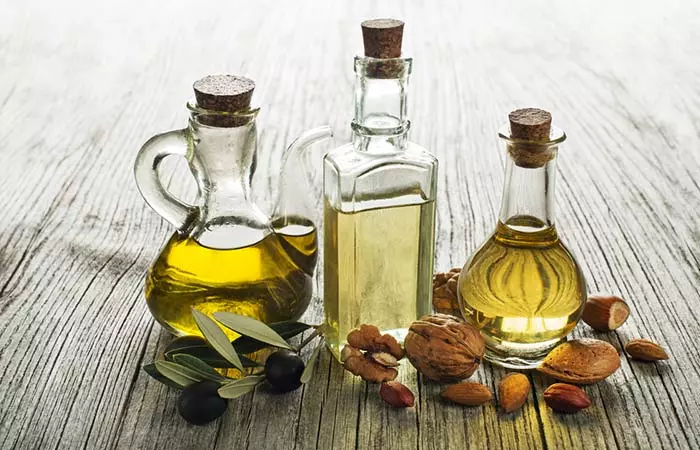
Olive oil contains oleuropein, which induced hair loss in mouse studies (12). It also conditions your hair and enhances shine. Here is what you will need to make this nourishing DIY hair oil.
You Will Need
- 1 tablespoon almond oil
- 1 tablespoon olive oil
Processing Time
45 minutes
Method
- Combine the oils in a bowl and massage it into your scalp.
- After massaging your scalp for 5-10 minutes, work the oil downwards, along the length of your hair, to the tips.
- Let it sit for an additional 30 minutes.
- Wash off with a mild shampoo.
How Often?
You can repeat this 3 times a week.
5. Almond Oil With Banana And Honey
If your hair fall problem has stemmed due to dryness, this mask is one of the best ways to treat it. Banana and honey have emollienti Substances or ingredients that create a thin, protective barrier that keeps the hair soft and moisturized. properties (13), (14). They can deeply condition your hair, leaving it feeling smooth and silky.
You Will Need
- 1 ripe banana
- 2 tablespoons almond oil
- 1 tablespoon honey
Processing Time
45 minutes
Method
- Mash the banana until there are no lumps and add the honey and almond oil to it. Mix until all the ingredients are well combined.
- Apply the hair mask in sections to freshly washed and dried hair.
- Let it sit for 45 minutes.
- Wash off with a mild shampoo.
How Often?
Use this hair mask once a week.
 Quick Tip
Quick TipWhile almond oil provides various benefits for hair, it’s important to be aware of the potential side effects it may cause. Scroll down to read the possible downsides of this oil.
Side Effects Of Almond Oil For Hair
Using almond oil on your hair is generally safe and doesn’t usually have any side effects. However, avoid applying pure almond oil before heat-styling your hair, as it can get hot and potentially cause burns on your scalp or hair shaft. Also, some individuals, particularly infants and pregnant women, may experience side effects like dermatitis, rashes, or itching (15). If you have a nut or almond allergy, steer clear of using this oil. If you notice any adverse effects, consult a doctor for proper treatment. If you are using hair treatments like minoxidil, please consult your doctor before pairing it with almond oil.
Infographic: 5 Benefits Of Almond Oil For Hair
Adding almond oil to your hair care routine may help strengthen your tresses and control hair loss. The antioxidant-rich oil cleanses your scalp and nourishes hair strands from within. It is rich in vitamin E and fatty acids that treat hair issues and boost hair health. Check out the infographic below to learn the 5 top benefits of almond oil for your hair.

Illustration: StyleCraze Design Team
If you are experiencing hair loss and looking for sustainable options, you can use almond oil to control hair loss. The oil, since it is extracted from the seeds, provides some benefits of almonds due to its rich essential vitamins, minerals, and antioxidants content that aid hair health in several ways. Its antioxidant and anti-inflammatory properties promote hair growth, boost blood circulation, control oil production, and repair hair damage. You can apply almond oil in combination with natural ingredients like lemon juice, egg, olive oil, banana, honey, or yogurt once a week to get smooth and shiny hair.
Frequently Asked Questions
Can we apply almond oil directly to the hair?
Yes. Rub a small amount of almond oil between your palms and massage it into the hair strands.
How long does almond oil take to work?
Anecdotal evidence suggests that almond oil takes two-three weeks of consistent use to show results.
Can I leave almond oil in my hair for 2 days?
No. Almond oil can clog your pores and attract dirt, making your scalp greasy and unhealthy.
Can we apply almond oil overnight?
Yes. You can leave almond oil in your hair overnight for deep hair hydration if you have a dry scalp.
Can I mix coconut oil with almond oil?
Yes. You can mix coconut and almond oils before applying them to your scalp.
Illustration: How To Use Almond Oil To Help Control Hair Loss
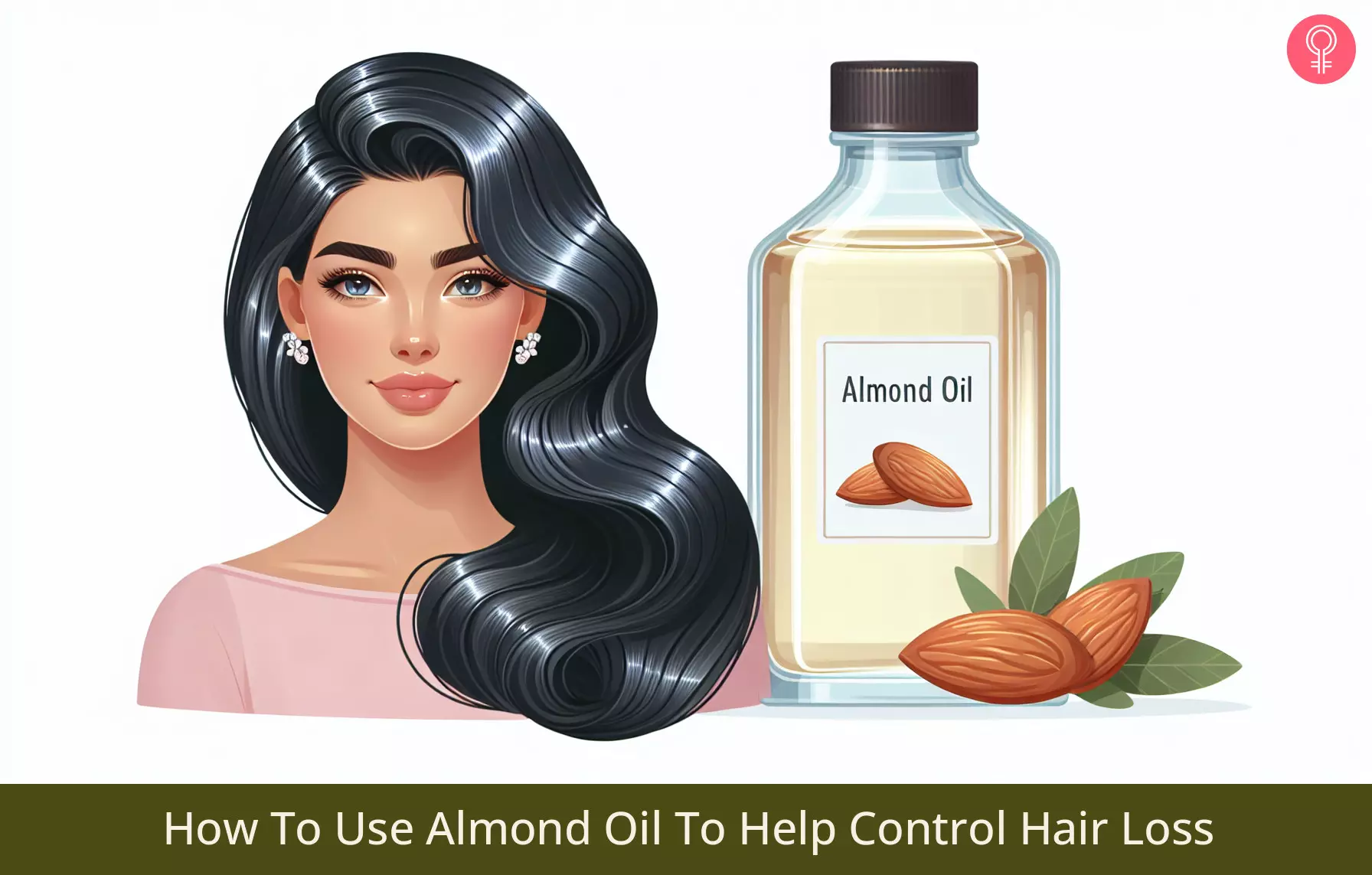
Image: Dall·E/StyleCraze Design Team
Experience the magic of transforming thin hair into thick, luscious locks with almond hair oil. Watch the video below to unlock the secret.
Personal Experience: Source
StyleCraze's articles are interwoven with authentic personal narratives that provide depth and resonance to our content. Below are the sources of the personal accounts referenced in this article.
(i) Almond Oil for Hair Growth and Repair + How to Apply Almond Oil Hair Mask to Stimulate Hair Growthhttps://www.youtube.com/watch?v=PIFw4kMBkzs
References
Articles on StyleCraze are backed by verified information from peer-reviewed and academic research papers, reputed organizations, research institutions, and medical associations to ensure accuracy and relevance. Read our editorial policy to learn more.
- Gupta, Amit, et al. “Indian Medicinal Plants Used in Hair Care Cosmetics: A Short Review.” Pharmacognosy Journal, 2010.
https://phcogfirst.com/ - Singh, N., et al. “Indian medicinal plants: For hair care and cosmetics.” World J Pharm Sci11 (2014): 1552-1556.
https://www.academia.edu/9066861/Indian_medicinal_plants_For_hair_care_and_cosmetics - Characterization of Sweet Almond Oil Content of Four European Cultivars (Ferragnes, Ferraduel, Fournat, and Marcona) Recently Introduced in Morocco
https://pmc.ncbi.nlm.nih.gov/articles/PMC8421184/ - Richardson, David P., et al. “The nutritional and health benefits of almonds: a healthy food choice.” Food Science and Technology Bulletin: Functional Foods4 (2009): 41-50.
https://www.researchgate.net/publication/250058086_The_nutritional_and_health_benefits_of_almonds_a_healthy_food_choice - Suraja, R., et al. “In vivo hair growth activity of Prunus dulcis seeds in rats.” Biol Med4 (2009): 34-8.
https://www.researchgate.net/publication/40507292_In_vivo_hair_growth_activity_of_Prunus_dulcis_seeds_in_rats - Zaid, Abdel Naser et al. “Ethnopharmacological survey of home remedies used for treatment of hair and scalp and their methods of preparation in the West Bank-Palestine.” BMC complementary and alternative medicine 17,1 355.
https://www.ncbi.nlm.nih.gov/pmc/articles/PMC5499037/ - Doğru, Bilgehan. (2003). Vitamin E as an antioxidant. Ankara Universitesi Eczacilik Fakultesi Dergisi. 32. 243-267.
https://www.researchgate.net/publication/287588492_Vitamin_E_as_an_antioxidant - Beoy, Lim Ai et al. “Effects of tocotrienol supplementation on hair growth in human volunteers.” Tropical life sciences research 21,2 (2010): 91-9.
https://www.ncbi.nlm.nih.gov/pmc/articles/PMC3819075/ - Ahmad, Zeeshan. “The uses and properties of almond oil.” Complementary Therapies in Clinical Practice1 (2010): 10-12.
https://pubmed.ncbi.nlm.nih.gov/20129403/ - Pullar, Juliet M et al. “The Roles of Vitamin C in Skin Health.” Nutrients 9,8 866.
https://www.ncbi.nlm.nih.gov/pmc/articles/PMC5579659/ - Nakamura, Toshio, et al. “Naturally Occurring Hair Growth Peptide: Water-Soluble Chicken Egg Yolk Peptides Stimulate Hair Growth Through Induction of Vascular Endothelial Growth Factor Production.” Journal of medicinal food7 (2018): 701-708.
https://pubmed.ncbi.nlm.nih.gov/29583066/ - Tong, Tao et al. “Topical Application of Oleuropein Induces Anagen Hair Growth in Telogen Mouse Skin.” PloS one 10,6 e0129578.
https://www.ncbi.nlm.nih.gov/pmc/articles/PMC4462586/ - P., Sampath Kumar, et al. “Traditional and Medicinal Uses of Banana .” Journal of Pharmacognosy and Phytochemistry vol 1,3 2668735-5.
https://www.phytojournal.com/vol1Issue3/Issue_sept_2012/9.1.pdf - Burlando, Bruno, and Laura Cornara. “Honey in dermatology and skincare: a review.” Journal of Cosmetic Dermatology4 (2013): 306-313.
https://pubmed.ncbi.nlm.nih.gov/24305429/ - Ouzir, Mounir et al. “Almond oil: A comprehensive review of chemical composition, extraction methods, preservation conditions, potential health benefits, and safety.” Comprehensive reviews in food science and food safety vol. 20,4 (2021): 3344-3387.
https://pubmed.ncbi.nlm.nih.gov/34056853/
Read full bio of Madison Dufour
Read full bio of Anjali Sayee
Read full bio of Ramona Sinha
Read full bio of Monomita Chakraborty






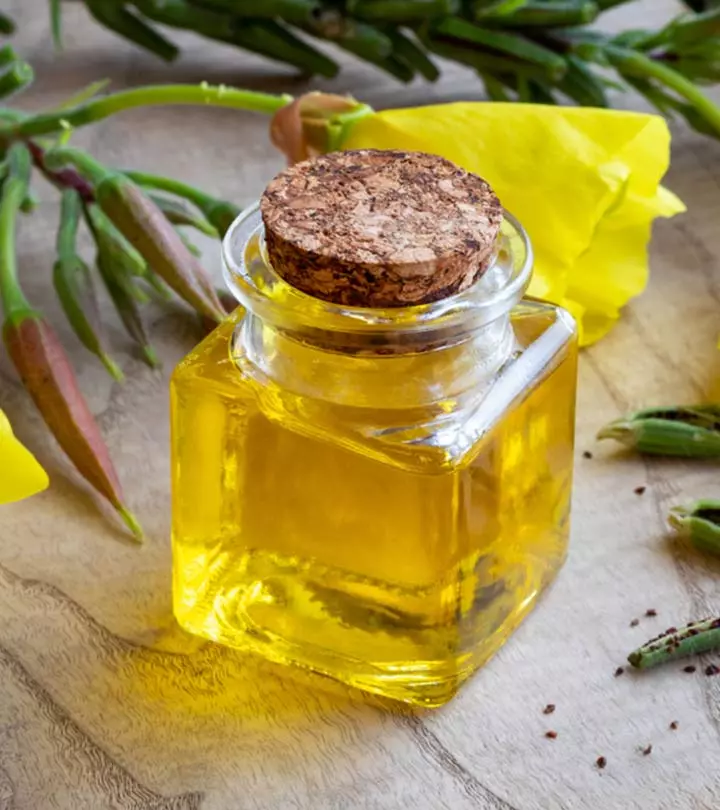
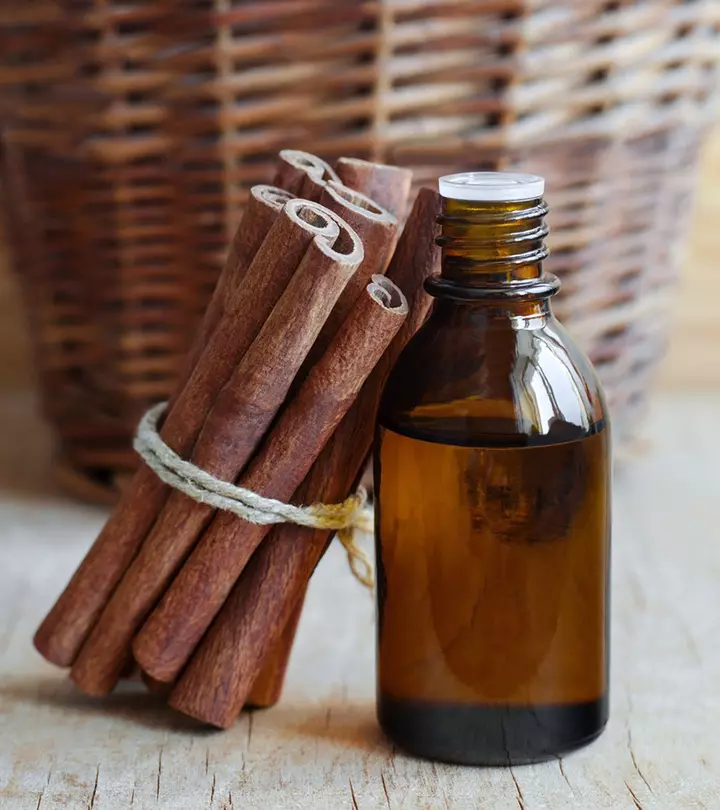
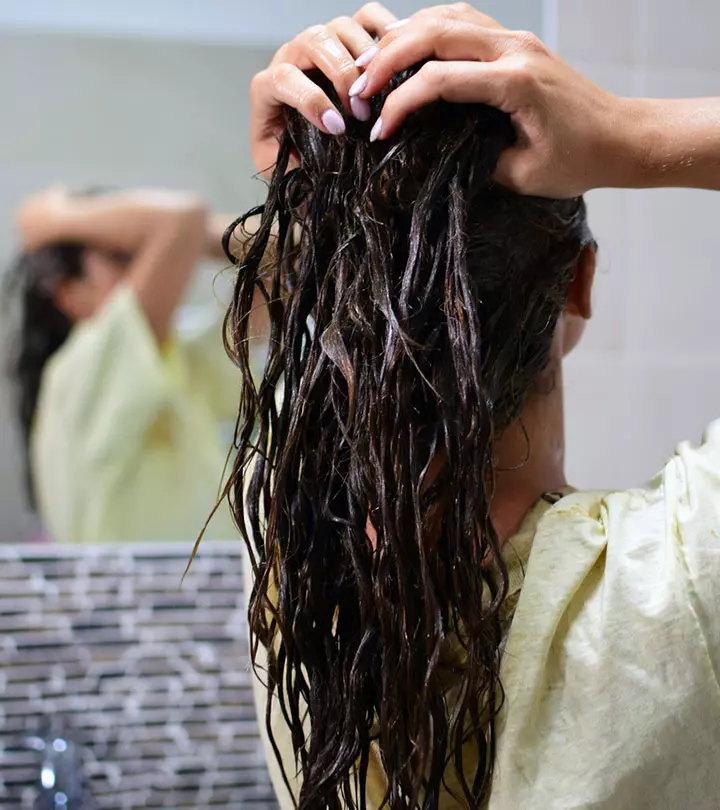
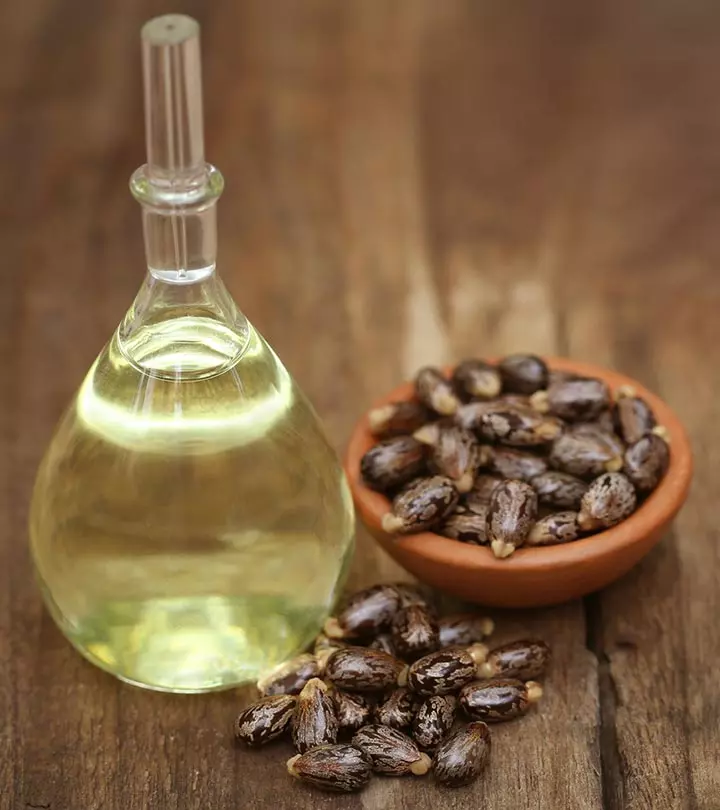
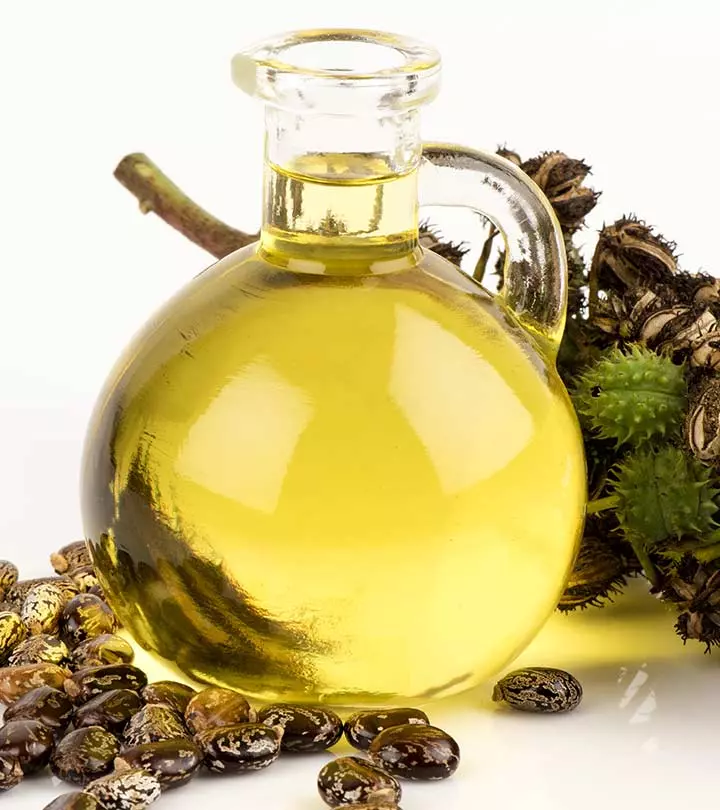

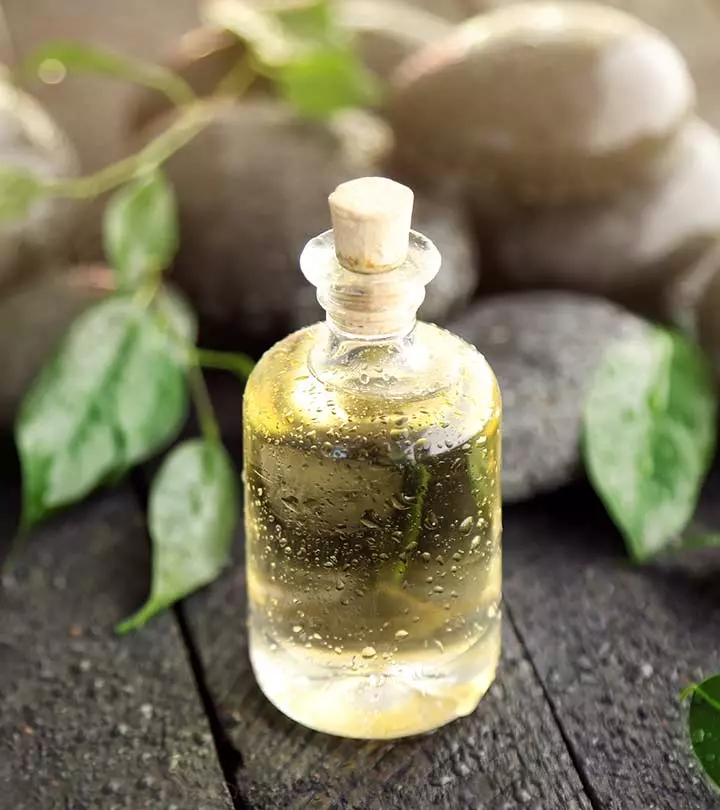
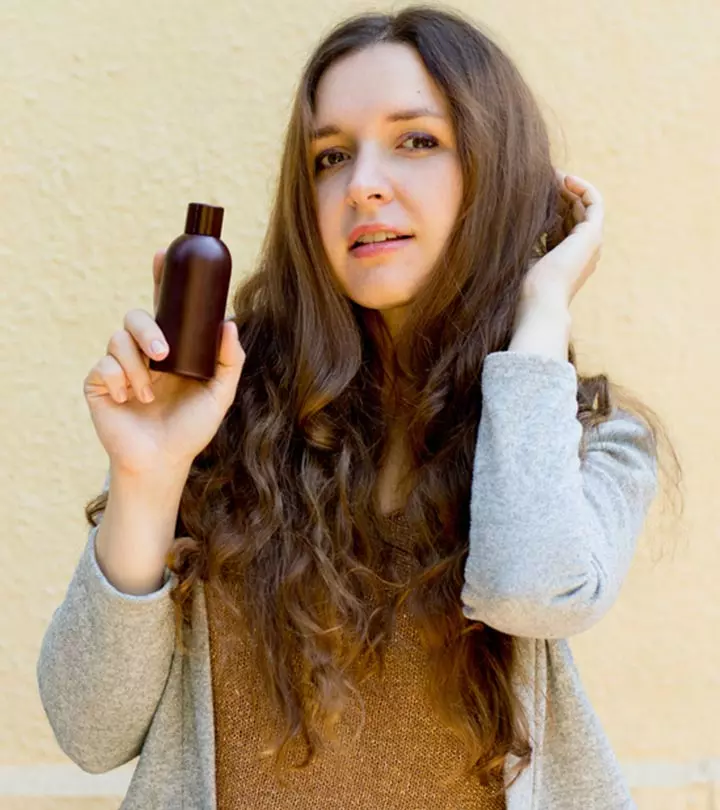


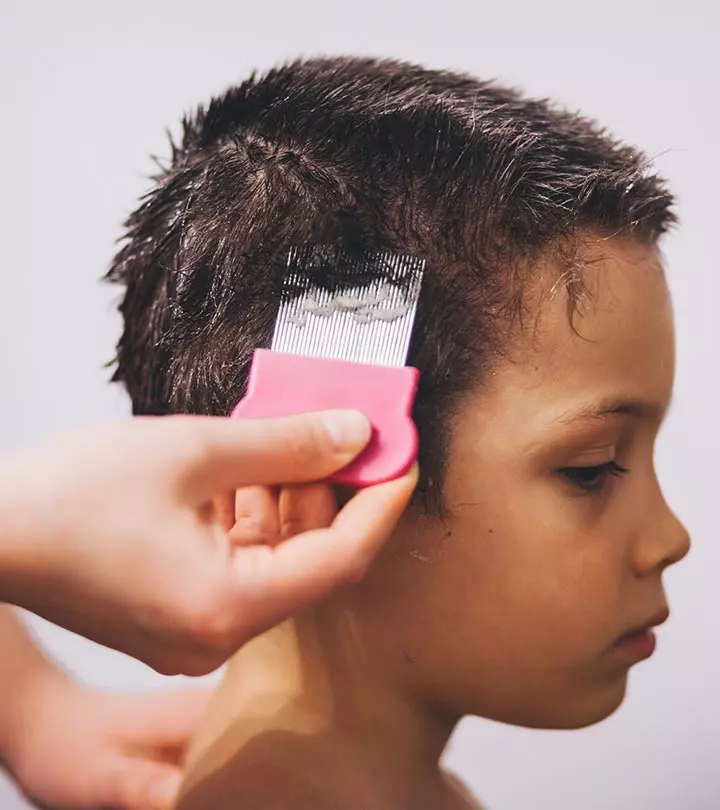


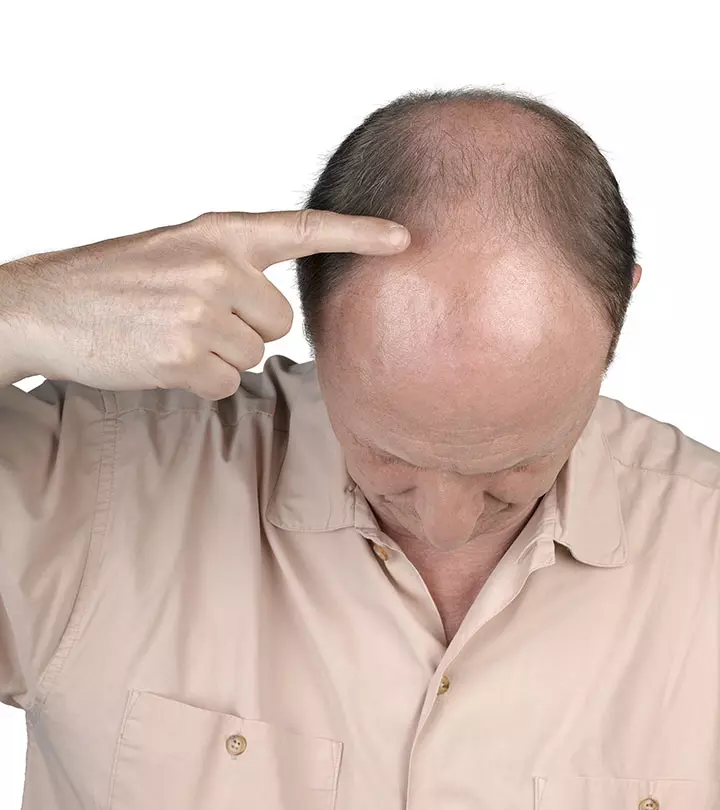


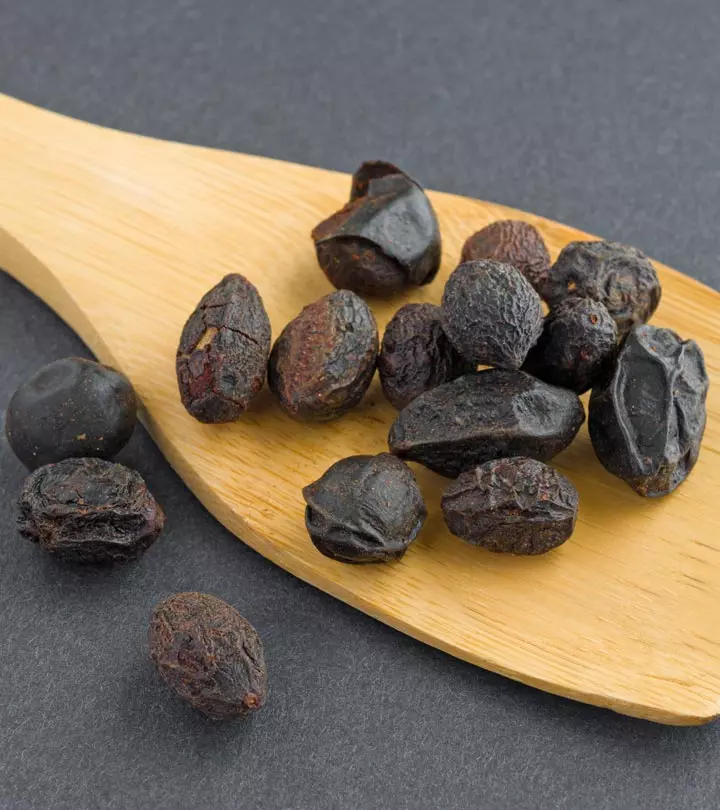
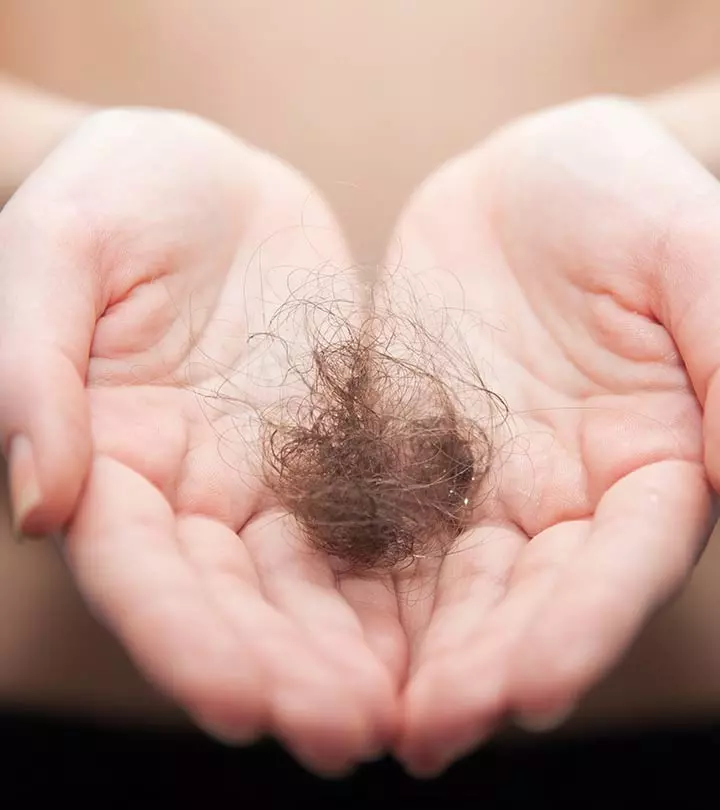
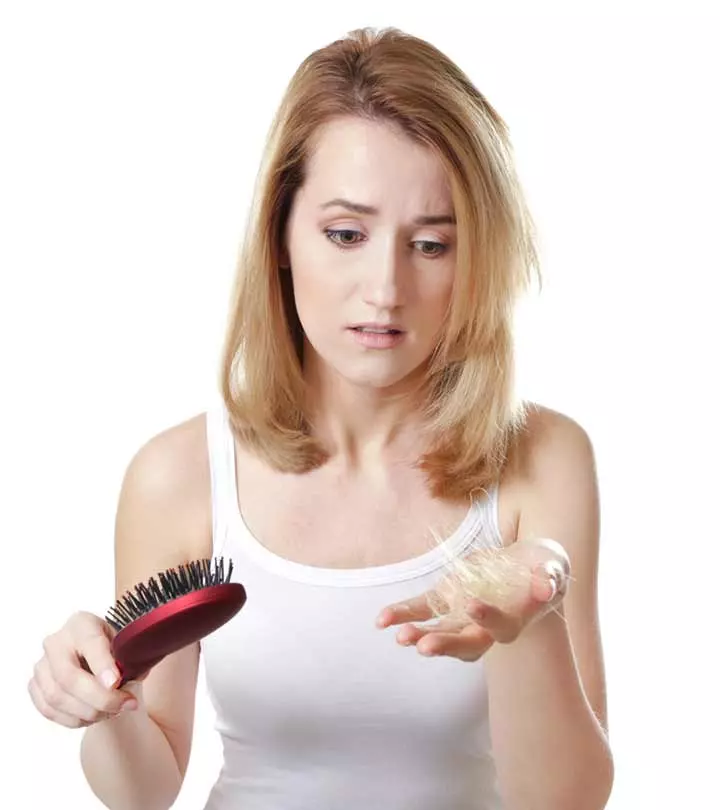
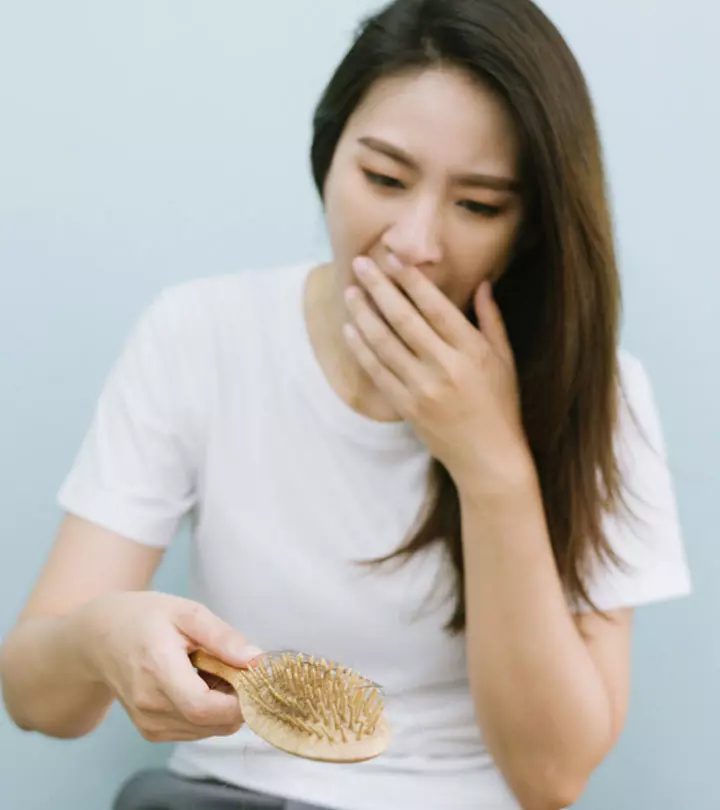
Community Experiences
Join the conversation and become a part of our empowering community! Share your stories, experiences, and insights to connect with other beauty, lifestyle, and health enthusiasts.